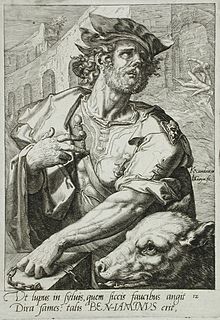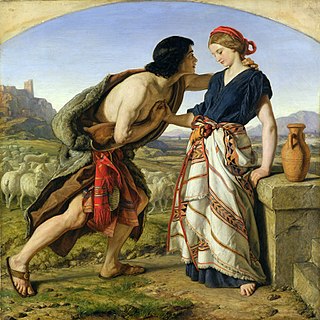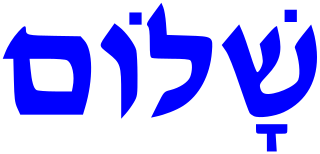 W
WBenjamin is a popular given name for males, derived from Hebrew בִּנְיָמִין, Binyāmīn, translating as "son of the right [hand]", though in the Samaritan Pentateuch, the name appears as "Binyaamem": "son of my days".
 W
WDaniel is a masculine given name and a surname of Hebrew origin. It means "God is my judge", and derives from two early biblical figures, primary among them Daniel from the Book of Daniel. It is a common given name for males, and is also used as a surname. It is also the basis for various derived given names and surnames.
 W
WDavid is a common masculine given name of Biblical Hebrew origin, as King David is a figure of central importance in the Hebrew Bible and in Christian, Sabbatean Judaism, and Islamic religious tradition.
 W
WEl'ad, also spelled Elad, is a city in the Center District of Israel. It was built in the 1990s for a Haredi and to a lesser extent Religious Zionist Jewish population. Located about 25 kilometres (16 mi) east of Tel Aviv on Route 444 between Rosh HaAyin and Shoham, it had a population of 48,763 in 2019. El'ad is the only locality in Israel officially designated a religious municipality. The name El'ad means "Forever God", but it is also named after a member of the tribe of Ephraim, who lived in this area.
 W
WA golem is an animated anthropomorphic being in Jewish folklore which is entirely created from inanimate matter. In the Psalms and medieval writings, the word golem was used as a term for an amorphous, unformed material.
 W
WThe terms Hebrews and Hebrew people are mostly considered synonymous with the Semitic-speaking Israelites, especially in the pre-monarchic period when they were still nomadic. However, in some instances it may also be used in a wider sense, referring to the Phoenicians, or to other ancient groups, such as the group known as Shasu of Yhw on the eve of the Bronze Age collapse, which appears 34 times within 32 verses of the Hebrew Bible. It is sometimes regarded as an ethnonym and sometimes not.
 W
WImmanuel is a Hebrew name that appears in the Book of Isaiah (7:14) as a sign that God will protect the House of David.
 W
WIsaac or Isaak, transliterated from as Itzhak or Yitzhak, or Yitzchok, was one of the three patriarchs in the Hebrew Bible, whose story is told in the book of Genesis.
 W
WJael or Yael is a woman mentioned in the Book of Judges in the Hebrew Bible, as the heroine who killed Sisera to deliver Israel from the troops of King Jabin.
 W
WJohn is a common masculine given name in the English language of Semitic origin. The name is derived from the Latin Ioannes and Iohannes, which are forms of the Greek name Iōánnēs (Ἰωάννης), originally borne by Hellenized Jews transliterating the Hebrew name Yohanan, "Graced by Yah", or Yehohanan, "Yahweh is Gracious". There are numerous forms of the name in different languages; these were formerly often simply translated as "John" in English but are increasingly left in their native forms.
 W
WJoshua is a given name derived from the Hebrew יהושע (Yehoshua), prominently belonging to Joshua, an early Hebrew leader of the Exodus period who has a major role in several books of the Bible. The name was a common alternative form of the name יֵשׁוּעַ yēšūă which corresponds to the Greek spelling Ἰησοῦς (Iesous), from which, through the Latin Iesus, comes the English spelling Jesus. As a result of the origin of the name, a majority of people before the 17th century who have this name were Jewish. A variant, truncated form of the name, Josh, gained popularity in the United States in the 1970s.
 W
WLeah is an important figure in the Judeo-Christian tradition, the unloved wife of the Biblical patriarch Jacob. Leah was Jacob's first wife, and the older sister of his second wife Rachel. She is the mother of Jacob's first son Reuben. She has three more sons, namely Simeon, Levi and Judah, but does not bear another son until Rachel offers her a night with Jacob in exchange for some mandrake root דודאים (dûdâ'îm). Leah gives birth to two more sons after this, Issachar and Zebulun, and a daughter called Dinah.
 W
WMelech or Meilech is a given name of Hebrew origin which means king. It is a name used by Jewish people.
 W
WMichael is a masculine given name derived from the Hebrew phrase מי כאל mī kāʼēl, 'Who [is] like-El', in Aramaic: ܡܝܟܐܝܠ. The theophoric name is a rhetorical question – "Who [is] like [the Hebrew God] El?", whose answer is "there is none like El", or "there is none as famous and powerful as God." This question is known in Latin as Quis ut Deus?. Although sometimes considered erroneous, an alternative spelling of the name is Micheal.
 W
WNathan is a masculine given name. It is derived from the Hebrew verb נָתָן meaning gave. The meaning of the name in Jewish culture could be rendered "he has given" or "he will give".
 W
WRachel was a Biblical figure, the favorite of Jacob's two wives, and the mother of Joseph and Benjamin, two of the twelve progenitors of the tribes of Israel. Rachel's father was Laban. Her older sister was Leah, Jacob's first wife; their mother was Adinah. Her aunt Rebecca was Jacob's mother.
 W
WReshit Chochmah is an important book of Kabbalah, ethics and morality, written by the 16th century scholar Rabbi Eliyahu de Vidas. It is based largely on the Zohar. Its name literally translates into “the beginning of Wisdom”, in allusion to the Biblical verse "The fear of the Lord is the beginning of wisdom".
 W
WSefer Raziel HaMalakh,, is a grimoire of Practical Kabbalah from the Middle Ages written primarily in Hebrew and Aramaic. Liber Razielis Archangeli, its 13th-century Latin translation produced under Alfonso X of Castile, survives.
 W
WShalom is a Hebrew word meaning peace, harmony, wholeness, completeness, prosperity, welfare and tranquility and can be used idiomatically to mean both hello and goodbye.
 W
WTobias is the transliteration of the Greek Τωβίας which is a translation of the Hebrew biblical name "Toviyah", meaning "God is good". It is a popular male given name for both Christians and Jews in English-speaking countries, German-speaking countries, the Low Countries, and Scandinavian countries. In English-speaking countries, it is often shortened to Toby. In German, this name appears as Tobias or Tobi; in French as Tobie; and in Swedish as Tobias or Tobbe. Tobias has also been a surname.
 W
WZe'ev, also spelled Zev, is a name of Hebrew origin which means wolf. The given name is a masculine form used among Ashkenazi Jews. It is a Biblical name, adapted from a reference to Benjamin in Genesis as a "wolf that raveneth". It re-appeared in relatively recent times as a translation of the Yiddish name װאָלף "Volf" or "Wolf". The name "Wolf" was relatively common among Germans.
 W
WZephaniah is the name of several people in the Hebrew Bible and Jewish Tanakh; the most prominent one being the prophet who prophesied in the days of Josiah, king of Judah and is attributed a book bearing his name among the Twelve Minor Prophets. His name is commonly transliterated Sophonias in Bibles translated from the Vulgate or Septuagint. The name might mean "Yah has concealed", "[he whom] Yah has hidden", or "Yah lies in wait".